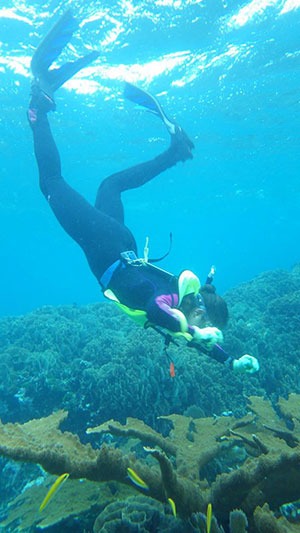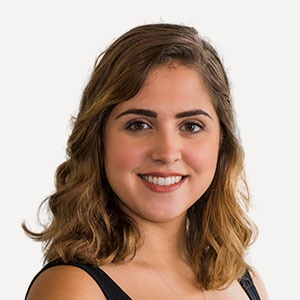
Student Spotlight
Ashley Miller-Dykeman is a marine biologist and an MA candidate in the Duke Initiative for Science & Society’s Master in Bioethics & Science Policy program.Is Nuclear Power As Scary As it Seems?
If you consider their educational background, Ashley Miller-Dykemen and her husband Zachary Dykeman are an unlikely pair. Ashley is an environmental biologist pursuing her master in bioethics and science policy, while Zach works heads down as a U.S. Military Nuclear Engineer.
When asked whether being in a relationship with a nuclear engineer conflicted with her interest in environmental policy, Ashley answered, “It did at first. When we first started dating I wasn’t really heavy into environmental science yet. I was still an undergrad. And he was a nuclear engineer from the get-go. I didn’t really understand it.”
Ashley is not alone. Nuclear power remains a highly discussed topic in research and public discourse. It’s a complicated subject and threatening when you consider its negative potential. Just referencing the topic is enough to bring images of mushroom clouds, billowing cooling towers, and glowing green pools of waste to mind.
History, Hollywood, and the media heavily influence society’s perception of the technology and for many that may be as far as the conversation goes. For Ashley and her husband, that wasn’t an option. Being trained as scientists may have helped the two see eye to eye, but for Ashley, communication issues like these created a desire to study how science is translated to the broader public.
While focused on marine science, she found it difficult to avoid related policy debates. The questions and conversations that regularly arose seemed inextricable from her environmental studies and eventually inspired her to focus her efforts on science communication and science policy at Duke.
“What good is ground-breaking, really cool science if no one understands it except the scientists?” Says Ashley. “I thought it was really important for the public to understand the science. So much science can be accessed by the public if it’s told in the right way.”
As an exercise in her Communication for Scientists class, an elective in the Duke Master in Bioethics & Science Policy program, Ashley interviewed her husband for a podcast exploring nuclear power. She asks the simple question, is it really as scary as it seems?
Listen to Ashley’s podcast below:

image courtesy of the Boston University Marine Program
Becoming familiar with podcasting is just one component of the Communication for Scientists course taught by Dr. Jory Weintraub, a senior lecturing fellow at the Duke Initiative for Science & Society.
“We look at all different aspects of science communication,” says Dr. Weintraub. “Written communication. Oral communication. We look at science policy. We talk about doing media interviews. And we explore the way science is communicated in the courtroom. I tell my students that this is not how to talk to your scientific peers about your work, but how to talk to everyone else.”
Learning to better communicate good science to the public and policymakers is an important theme in the Duke Initiative for Science & Society.
Ashley believes exploring new ways to communicate science will not only reach the public more effectively, but will also force researchers to think about their work in a different way. When done right, the result should be a more concise and convenient way to deliver their findings.
Learn more about the Duke Bioethics & Science Policy Program and see how other students are putting their science to service for society.
Intrigued by Zachary’s comments in the podcast we looked into his nuclear waste statistic.The Nuclear Energy Initiative’s website explains, “Over the past four decades, the entire industry has produced 76,430 metric tons of used nuclear fuel. If used fuel assemblies were stacked end-to-end and side-by-side, this would cover a football field about eight yards deep.”
About Ashley:
 Ashley Miller-Dykeman is a marine biologist and an MA candidate in the Duke Initiative for Science & Society’s Masters of Bioethics & Science Policy program.
Ashley Miller-Dykeman is a marine biologist and an MA candidate in the Duke Initiative for Science & Society’s Masters of Bioethics & Science Policy program.
Additional comments from Ashley:
I earned my BA in biology and with a minor in marine science from Boston University in May of 2016. During my final year as an undergraduate, I began to develop a passion for science policy; particularly how policy interacts with environmental science and communicating science to the general public. I decided to pursue my MA in bioethics and science policy at Duke with the hope of acquiring a more extensive understanding of bioethics and policy. My primary focus, however, is on science communication and bridging the gap between scientists and non-scientists.

